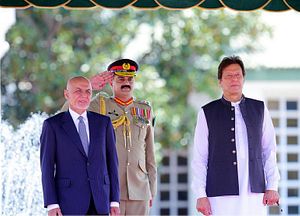Afghan President Ashraf Ghani’s visit to Islamabad from June 27 to 28 is yet another step aimed at enhancing political, security, and economic cooperation with Pakistan after a years-long breakdown in relationship between the two countries. It is Ghani’s second such bilateral visit; the first visit, in November 2014, did not lead to any major breakthrough despite his hopes (Ghani also journeyed to Pakistan in 2015 for the multilateral Heart of Asia Conference). As a result, Ghani has taken up a hand-off approach toward Pakistan and ignored repeated invitations from Islamabad to visit since then. Now, nearly five years later, he is giving it another try, encouraged by a request from the Afghan consultative peace Jirga held in late April 2019 in Kabul.
Ghani is visiting Islamabad with renewed hope but also cautious optimism. The caution is because of Pakistan’s past behavior in engagement with various Afghan governments and the country’s longstanding quest to weaken the Afghan state. Pakistan infamously pursued a double-standard policy, being an ally of the United States in the global war on terror even while continuing to work hand in glove with the Taliban to fuel conflict against the Afghan state. More recently, Islamabad suggested installing an interim Afghan government as an important precursor to restoring peace in Afghanistan. Such a suggestion makes Afghans cynical about Pakistan’s sincere commitment because it weakens the process of to state building and paves the way for continued conflict in Afghanistan, as past experiences have shown.
Cynicism among Afghans toward Pakistan, however, should not preclude maintaining a relationship and engaging with Pakistan all levels. Ghani has taken a step in the right direction by making this visit. However, amid debate over what to expect from Pakistan, two key questions surface about the country’s perceived interests and its past engagement with Afghan governments.
The first question is about Pakistan’s interests and to what extent and ends it has the will to play a constructive role in Afghanistan in the light of those interests. Pakistan does not shy away from questioning how its interests are served by helping the Afghan government and the Taliban reconcile in a way that enables Afghanistan to act with the capacity of a state, with little or declining influence from outside. Pakistan argues that it no longer seeks strategic depth in Afghanistan, which maybe true; however, arch rival India still guides Pakistan’s strategic direction in Afghanistan. This is no less concerning for Afghans than the past policy of strategic depth.
Pakistan’s paranoia about India continues to loom large in any strategic maneuver it chooses in Afghanistan. As an example of this inclination, Islamabad directly linked the standoff between India and Pakistan in the aftermath to dynamics in Afghanistan. Foreign Minister Shah Mahmood Qureshi, during the heat of the standoff, was loud and clear that any conflict between India and Pakistan would have a direct impact on the Afghan reconciliation process.
Therefore, the India factor should remain a fundamental question for Afghanistan in dealing with Pakistan. This makes it hard for Afghanistan to trust Pakistan’s sincerity in providing the “brotherly role” that it speaks of. The ball in this regard is in Pakistan’s court. One might argue that the Afghan government has not done enough to address Pakistan’s misgivings about India. On the contrary, the Afghan government undertook solid measures to address Pakistan’s misgivings, but in line with the legitimate interests of Afghanistan. In terms of confidence building measures with Pakistan, Ghani made his third visit as president (after China and Saudi Arabia) to Pakistan. The Afghan government went as far as stopping the practice of blaming Pakistan for its interference in Afghanistan but these efforts were not reciprocated.
The second question is whether Pakistan really has the level of influence it claims to exert on the Afghan Taliban. That the Taliban sanctuaries are in Pakistan is a fact, but whether these sanctuaries represent more a “marriage of convenience” or a deep strategic bind between the two is a critical point to heed to and clarify. It is likely that Pakistan could be exaggerating its leverages vis-à-vis the Taliban in a bid to increase its importance and use this supposed influence as a bargaining chip to win compromises in Afghanistan. If this is the case, dignifying Pakistan’s role and allowing more space to Pakistan than it really deserves is shortsighted. But it’s also possible that Pakistan attributes a large role because it really does have the influence it claims over the Taliban. If true, that scenario strengthens Ghani’s stance that a regional consensus must be in place, with Pakistan being pressured to cooperate, before moving on to negotiate with the Taliban.
The above question is important because of contradictions in the Taliban’s and Pakistan’s claims. Pakistan presents itself as having at least indirect control over Taliban, while the Taliban insist they are independent from Pakistan. This ambiguity has to be addressed for Afghanistan to engage with Pakistan effectively. If the Taliban are motivated by “religious and nationalist” sentiments, the fight in Afghanistan will not end just because Pakistan tells them so; it ends when they reach a peace agreement with the United States and the Afghan government. On the other hand, if the Taliban that are actually “strategic assets” to Pakistan, religious and nationalist sentiments are not important; the group would instead swim with the waves Pakistan creates.
Faced with such complexity its relationship with Pakistan, Afghanistan is walking a tight rope. According a large role to Pakistan without digging deep enough to understand the real picture will only meet with more dead ends.
Halimullah Kousary formerly served as director of research with the Centre for Conflict and Peace Studies (CAPS) based in Kabul. He is currently serving as director of research with Shajjan @ Associates. He tweets at @hkousary

































